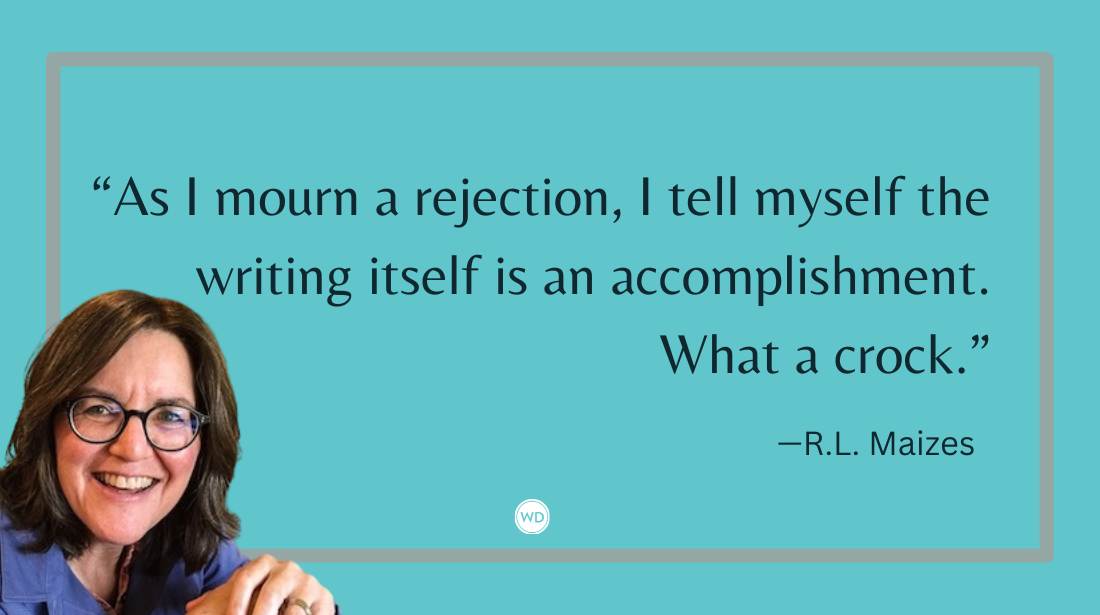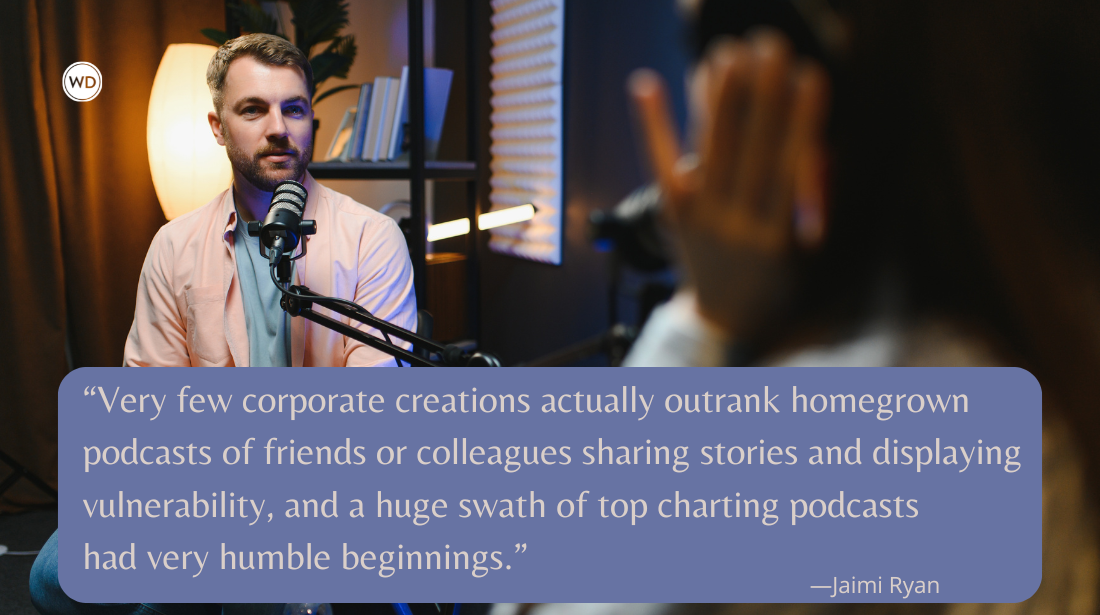Writing Can Be Learned—But It Can’t Be Taught
The following guest post by Lawrence Block originally appeared in the October 1982 issue of Writer’s Digest magazine. It ran under the headline “Crockpot Macramé.” — Good morning, class. Good…
The following guest post by Lawrence Block originally appeared in the October 1982 issue of Writer's Digest magazine. It ran under the headline "Crockpot Macramé."
--
Good morning, class.
Good morning, sir.
I’d like to talk a little this morning about a teaching job I interviewed for last week. I put on a jacket and real shoes and rode the subway and—yes, Rachel?
Did you get the job, sir?
I didn’t get it, and neither did it get me. I was coming to that, Rachel. Don’t rush me.
Sorry, sir, but the suspense was killing me. I was afraid you’d be disappearing into the halls of ivy and leaving us forever.
I could never leave you, Rachel. And this place didn’t have any ivy on its glass and steel walls. I didn’t notice any metaphorical ivy, either. I was interviewed by someone in the Continuing Education Department. I’d been recommended as a possible instructor in the writing of mystery and spy fiction, and the interview was designed to determine how I would approach such a course.
I answered by describing the course I’d taught at Hofstra University last season. My students prepared exercises each week, writing a scene or a story on an assigned topic, and class time was devoted to their reading their work aloud and criticizing one another’s efforts. This, I allowed, is hardly a revolutionary approach. I don’t much like it, but there’s this to say for it: every other method I’ve heard of is even worse.
My interviewer offered some objections. First of all, she said, my students would be paying for my expertise. If they were to get their money’s worth, they should be receiving my criticism, not the judgment of their peers. To this I said something about motes and beams, explaining that weaknesses are more apparent in another’s work than in one’s own, and insight that can be applied to one’s own writing comes most often by analyzing somebody else’s writing.
She seemed unconvinced, but moved on to another point. What the students were most interested in, she said, was getting published. That’s why they would be taking my course, so that they could turn out publishable work and, more important, get it into print. They would want market tips from me. They would want to know how to get an agent. They—
I could have left right then and there. For this I shaved? For this I put on real shoes? For this I changed trains at Queens Plaza?
I explained that I wasn’t terribly interested in providing market information. I added that I thought it might be a trifle previous, as they say down home, in that, whether or not you count chickens before they’re hatched, you certainly don’t run around trying to peddle them. Furthermore, I told her, I felt a course aimed specifically at the production of publishable fiction was unrealistic.
The odds were, I pointed out, that the vast majority of my students—or anybody else’s students—would never produce any marketable fiction. No instructor could change that fact. Writing is not computer programming. A school in computer programming can virtually guarantee its students that they will find jobs upon graduation. A writing school cannot begin to guarantee that a single one of its alumni will ever write anything that anyone would read with pleasure. This being the case—yes, Arnold? Did you say something?
I just said, “Here it comes,” sir.
Here what comes?
The bit about writing-can-be-learned-but-it-can’t-be-taught, sir.
Well, I’m glad you’re prepared, Arnold, because here it comes. Writing can be learned but it can’t be taught. And talent can’t even be learned. It can be developed, but only if it’s there. And the absence of talent is never visible, which is to say that, while I can look at one student’s work and say for certain that he’s talented, I can’t look at another’ s and say for sure that he’s not. I can only say that his talent hasn’t yet become visible.
What, then, can I as an instructor attempt to accomplish in a classroom? As far as I can see, I can create an environment that will best facilitate the students’ own development. I can stimulate students to write regularly and to come up with ideas on a regular basis.
I can direct the discussion of student work. Most students tend to be far too bland and supportive in their analysis of their fellows’ stories. “I liked it, it was interesting, I thought the descriptions were good”—that sort of critical Pablum doesn’t help the writer or anybody else. On the other hand, an occasional student with a sadistic streak can be cruel enough in his comments to hurt his fellow writers and inhibit their future efforts. I can draw his fangs and neutralize some of his venom.
I didn’t say all of this to the woman who interviewed me because there wasn’t really much point. It had become clear to me that this particular institution was dedicated, at least in its Continuing Ed program, to the Polly Adler principle of giving the paying customer whatever he wants. If 12 people will sign up for a course in Crockpot Macramé, for heaven’s sake provide the course and ballyhoo it in the catalog.
“The sort of student we draw,” my interviewer went on, “may not have done any writing before. He may have a particular book that he wants to write, and so he’s coming to take your course so that he can learn how to write his book and get it published. Now, what are you going to be able to do for him?”
“Wait a minute,” I said. “He hasn’t written anything?”
“Little or nothing.”
“And he has a book in mind that he wants to write?”
“That’s right. He has an idea for a novel, a mystery or spy novel, which is why he would select your course. Now, how will you teach him to write that book? What will he get out of your class?”
You know what I think I’ll do? I think I’ll go to a voice teacher. I’ll explain that I’ve never done any singing, except for belting out “On the Road to Mandalay” in the shower. I’ve booked Carnegie Hall for a Thursday night in November, and I want to make sure I’ll be terrific. What can the voice teacher do, I’ll ask, to guarantee that my debut will be a success?
Actually, the analogy is unfair. Shower singers like me don’t wind up onstage at Carnegie Hall, while every now and then somebody who never wrote a word, never took a course, never put pen to paper other than to jot down a laundry list, sits down at a typewriter and produces something that gets published. Maybe it turns out to be a bestseller, maybe they make a movie out of it, maybe the author winds up with his picture in People magazine. That sort of thing happens just often enough to keep the Crockpot Macramé people in business.
I have no quarrel with writers who achieve instant stardom in this fashion. I may envy them, tempering my envy with the knowledge that overnight success is not without problems of its own. Nor have I any quarrel, really, with people who aspire to this kind of success. I think their expectations are generally unfounded, as I think they’ll find out sooner or later, but that’s their problem. It’s not mine.
I do quarrel, though, with an educator who panders to this lust for overnight success. I expressed my reservations and stopped short of rejecting the job out of hand because I realized that, if they hired me, I could then teach the course my way. I wasn’t sure I wanted to, but I have a hard time turning down any money that I can get without writing. After a quarter century at the typewriter, getting paid to stand around and talk is like finding money in the street.
Even so, I decided in the next day or two to leave the filthy lucre in the gutter. Then I got a call informing me they’d found someone else, which made one less high moral stand I’ve had to take this month.
And it
Jane Friedman is a full-time entrepreneur (since 2014) and has 20 years of experience in the publishing industry. She is the co-founder of The Hot Sheet, the essential publishing industry newsletter for authors, and is the former publisher of Writer’s Digest. In addition to being a columnist with Publishers Weekly and a professor with The Great Courses, Jane maintains an award-winning blog for writers at JaneFriedman.com. Jane’s newest book is The Business of Being a Writer (University of Chicago Press, 2018).









